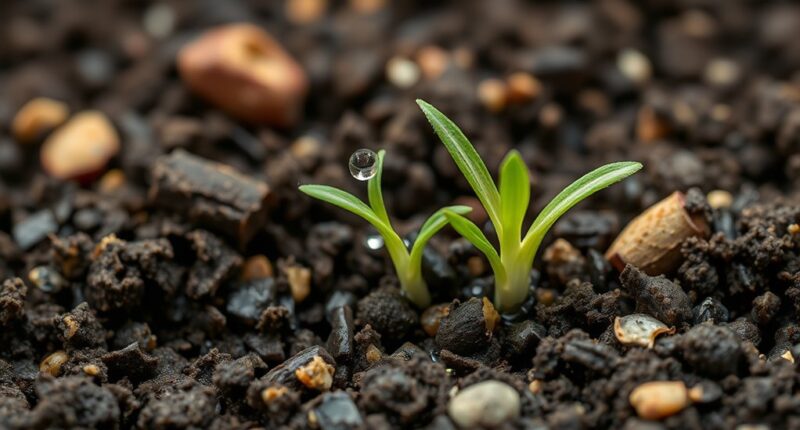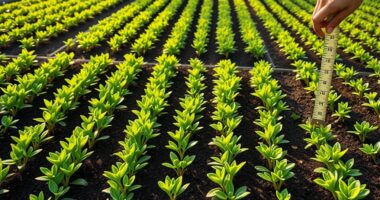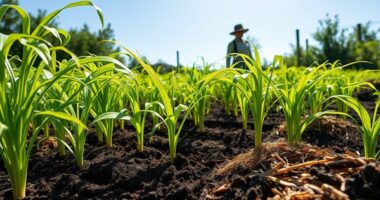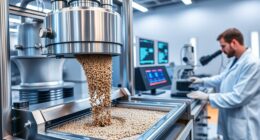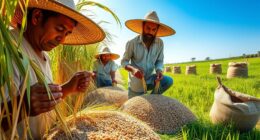If your chia seeds aren’t sprouting, check that you’re providing the right environment. Seeds need consistent moisture without soaking, warmth between 65°F and 85°F, and indirect light during germination. Avoid overwatering or letting the seeds sit in stagnant water, as this can cause rot. Make sure your seeds are fresh and of good quality. If conditions are right, sprouting may just take a bit longer—more tips will help you get those sprouts started.
Key Takeaways
- Ensure seeds are fresh and high-quality, as old or stored seeds have lower viability.
- Maintain consistent moisture levels without overwatering or letting seeds sit in stagnant water.
- Keep the environment within 65°F to 85°F, avoiding drafts and extreme temperatures.
- Provide indirect warmth and light after germination begins, but avoid direct sunlight initially.
- Be patient, as sprouting can take 7 to 14 days, and monitor environmental conditions regularly.
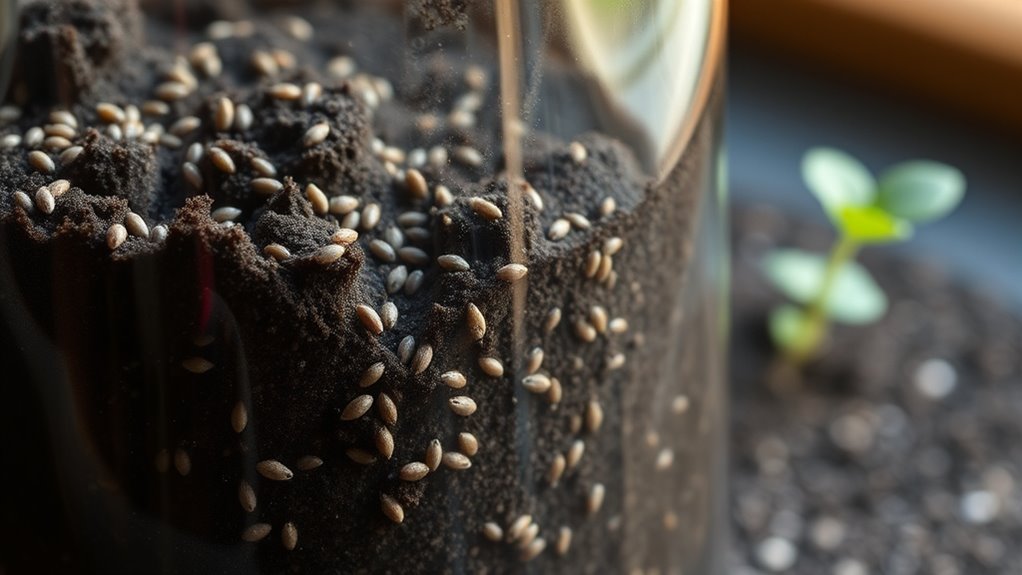
Are you struggling to get your Chia seeds to grow properly? If so, you’re not alone. Many people face challenges with seed germination when trying to cultivate Chia, but understanding the basics can make a big difference. The key to successful sprouting lies in providing the right environment and mastering proper watering techniques. Without these, your seeds may remain dormant or fail to sprout altogether.
First, it’s important to recognize that seed germination depends heavily on moisture, temperature, and light. Chia seeds need to be kept consistently moist but not soaked, as overly saturated conditions can cause them to rot or develop mold. When watering, avoid drenching the soil or your growing medium; instead, aim for gentle, even moisture. Using a spray bottle or misting can help you control the amount of water and prevent overwatering. The goal is to keep the seeds moist enough to trigger germination without drowning them. If your seeds aren’t sprouting, it might be because they’re either too dry or sitting in stagnant water. Adjust your watering techniques accordingly, ensuring the soil or growing medium remains damp but not soggy.
Keep chia seeds moist with gentle watering; avoid overwatering or dryness for best germination results.
Temperature is another critical factor. Chia seeds germinate best between 65°F and 85°F (18°C to 29°C). If your environment is cooler or warmer, it can hinder germination. Consider placing your container in a warm spot, away from drafts or direct sunlight, which can cause temperature fluctuations. Consistent warmth encourages the metabolic processes that kickstart sprouting. Additionally, understanding the importance of seed viability can help you select the best seeds for successful germination.
Light also plays a role, but Chia seeds don’t require direct sunlight to germinate. Instead, they need a warm, well-lit area once they sprout. Keep the seeds covered lightly with a moist cloth or plastic wrap to maintain humidity during germination, then gradually expose the sprouts to light as they emerge. This helps prevent mold and keeps the environment stable.
In addition, check your seeds’ freshness. Old or improperly stored seeds may have reduced viability, which can impede germination regardless of your watering techniques. Always use high-quality, fresh seeds for the best chance of sprouting.
Finally, patience is essential. Chia seeds typically take 7 to 14 days to sprout, but environmental factors can extend this period. Keep monitoring moisture levels, ensure the temperature stays consistent, and avoid disturbing the seeds once they’re germinating. With the right approach to seed germination and watering techniques, you’ll increase your chances of successful Chia sprouting and enjoy a thriving plant in no time.
Frequently Asked Questions
Can Overwatering Prevent Chia Seed Sprouting?
Overwatering can definitely prevent chia seed sprouting by causing watering issues like seed dormancy. When you water too much, the seeds may sit in overly moist conditions, which can hinder germination or even cause mold. To improve sprouting chances, make sure your soil is moist but not waterlogged. Proper watering helps break seed dormancy and encourages healthy sprouting, so avoid excessive watering to give your chia seeds the best start.
How Long Should I Wait Before Replanting Failed Seeds?
You should wait about 7 to 14 days before replanting failed chia seeds. Seed dormancy can delay germination, so patience is key. Keep the soil consistently moist and warm to support proper germination timing. If your seeds haven’t sprouted within this period, gently replant new ones, ensuring they’re not buried too deep. Giving your seeds enough time helps improve your chances of successful sprouting.
Does Seed Age Affect Sprouting Success?
Ever wonder if seed age impacts your germination timing? It definitely does. As seeds age, their viability drops, making sprouting less reliable. Fresh seeds tend to have higher chances of successful germination, while older ones may take longer or fail altogether. Don’t risk wasting time—use fresh seeds for the best results. Understanding seed viability helps you plan better and improves your chances of a successful chia sprout.
Are There Specific Soil Ph Levels Optimal for Chia Growth?
You’re wondering about the ideal soil pH levels for chia growth. Chia prefers a slightly acidic to neutral pH balance, around 6.0 to 7.0. Maintaining this pH guarantees your soil’s nutrients are available for healthy plant development. If the pH is too high or low, it can hinder nutrient absorption, affecting growth. Regularly test your soil and adjust as needed to keep the pH balanced and promote vigorous chia plants.
Can Indoor Lighting Impact Chia Seed Germination?
Think of indoor lighting as the sun’s gentle embrace, guiding your chia seeds’ journey. Adequate indoor lighting can spark seed germination, acting as the catalyst that awakens dormant life. Insufficient or harsh light can hinder this process, like a shadow over growth. To guarantee your chia seeds flourish, provide consistent, bright, indirect light, creating a nurturing environment where seed germination can thrive, just like sunlight in nature.
Conclusion
If your chia seeds aren’t sprouting, don’t get discouraged. For example, Sarah noticed her seeds weren’t growing because she used too much water, drowning the tiny sprouts. By adjusting her watering habits and ensuring proper temperature, she finally saw her chia seeds sprout within days. Remember, patience and proper care make all the difference. Keep troubleshooting, and you’ll soon enjoy lush, healthy chia sprouts thriving in your setup.
